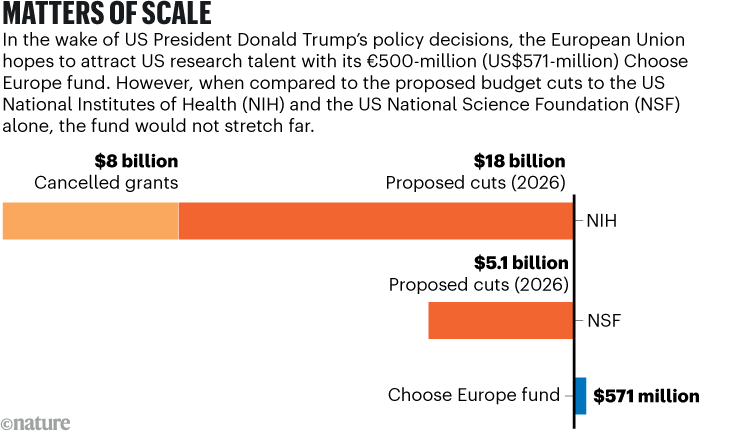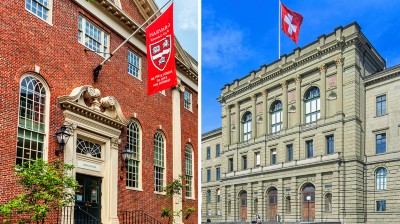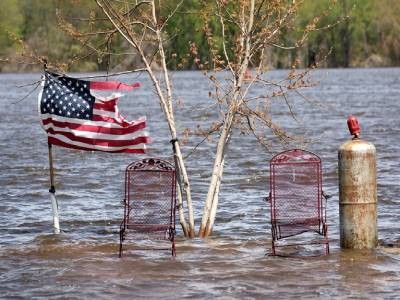In early Might, European politicians and college leaders gathered in Paris at Sorbonne College to ship a message to US researchers affected by cuts made by the administration of US President Donald Trump: transfer right here as an alternative.
Ursula von der Leyen, the president of the European Fee, and French President Emmanuel Macron introduced a 2-year funding bundle price €500 million (US$571 million) to help researchers who need to transfer to the continent, as a part of a scheme named Select Europe.
Though von der Leyen didn’t identify america or its president explicitly on the 5 Might gathering, she mentioned that elements of the world had been questioning “free and open analysis”, describing that perspective as a “gigantic miscalculation”.
In April, the French authorities introduced that cash from the nation’s €54-billion France 2030 strategic funding initiative had been put aside to fund worldwide researchers who want to work in France. Macron confirmed on the Sorbonne assembly that the separate €100-million money enhance would fund half of the prices of scientific tasks involving worldwide researchers transferring to France.
US mind drain: the scientists in search of jobs overseas amid Trump’s assault on analysis
These bulletins are the outcomes of intense lobbying each within the French parliament and on the European degree. A French-led convention, held in Brussels on 15 April and attended by French educational leaders and European policymakers, mentioned points round researcher mobility, partnerships and analysis programmes to assist European scientific diplomacy become familiar with the altering international panorama.
Economist Jean-François Huchet, who’s vice-president of France Universités, an affiliation of higher-education organizations based mostly in Paris and Brussels, hopes that coordinating the response on the European slightly than nation degree will assist to persuade US researchers of Europe’s seriousness, and allow the area to accommodate extra of those that need to transfer. On 19 March, a letter signed by analysis ministers from 13 European Union member states was despatched to Ekaterina Zaharieva, the EU’s commissioner for startups, analysis and innovation. It requested for devoted funding (subsequently granted by the €500 million for Select Europe) and a devoted immigration framework to “seize this historic second”.
“All these researchers need to discover a new nation, a brand new risk to proceed their work. It’s actually vital for them to proceed working. That’s the explanation why I pushed with Commissioner Zaharieva so as to add [these funds] to Select Europe. We need to assist researchers coming from all elements of the world, particularly america,” says Christophe Grudler, a French member of the European Parliament (MEP) who sits on the Committee on Trade, Analysis and Vitality. Grudler initiated a separate lobbying letter that was despatched on 24 March and addressed to each Zaharieva and von der Leyen.
“We will provide a number of issues: world-class universities, educational freedom, analysis ecosystems targeted on excellence, and freedom and help to scientists,” he says.
Jānis Paiders, the deputy state secretary for the Ministry of Schooling and Science of Latvia, provides that his nation was amongst these to endorse the 19 March letter “as a result of educational freedom is underneath menace the world over”. He additionally notes there’s “an ever-increasing want for Europe’s competitiveness as a complete”. Paiders requires an “exercise increase” to “welcome sensible skills from overseas”, saying the coverage aligns with each European and Latvian priorities.
Grudler’s 24 March letter, signed by 50 MEPs, said: “In response to this disaster, the European Union should act swiftly to ascertain itself as a protected haven for these scientific skills. We’ve the instruments and levers to take action, however we should speed up and increase our response.” The letter additionally referred to as for an accelerated visa technique.
Push–pull results
There may be rising proof that many US researchers are contemplating transferring overseas. An evaluation of Nature Careers jobs-board information confirmed that US functions for European vacancies elevated by 32% in March, in contrast with the identical month in 2024. And a self-selected ballot of Nature readers in March discovered that 75% of respondents had been eager to depart the nation.
However some query whether or not these developments will manifest as a large-scale exodus of expertise. For one factor, whereas early-career researchers could be cellular, senior lecturers, who’re prone to be extra enticing strategically for European policymakers, may discover it more durable to depart. “I might anticipate US politics to have the strongest results on PhD candidates, ending PhD college students and postdocs. These individuals are not as deeply connected to the US educational system but,” says Robert Basedow, who researches worldwide political economics on the London College of Economics and Political Science.
US epidemiologist Scott Delaney is one educational who would wrestle to depart. “I’ve two children in grade college, ageing mother and father and a accomplice who loves her job right here within the States.” Delaney runs a laboratory on the Harvard T. H. Chan College of Public Well being in Cambridge, Massachusetts, and his Nationwide Institutes of Well being (NIH) grant has been cancelled. “Relocating overseas could be a significant disruption for all of them.”
On prime of that, there’s a massive distinction within the wage a scientist may anticipate in Europe in contrast with that in america. In France, as an example, a mid-career researcher may earn round €3,600 a month earlier than taxes. A postdoctoral researcher at Stanford College in California, in contrast, would stand to earn the equal of round €6,000 a month, based on an evaluation by The New York Occasions.
Trump gutted two landmark environmental studies — can researchers save them?
“It must be a aggressive scenario to have the ability to appeal to researchers to return out” of america, says Thomas Kimbis, chief government of the US Nationwide Postdoctoral Affiliation in Bethesda, Maryland. Nevertheless, he says, “it relies upon what occurs over the approaching months. I feel the extra time postdocs are sitting with out a place, the extra enticing simply having a place, any place, turns into.”
There are variations, too, in bills: Europe is mostly cheaper to stay in. “You might have an enormous distinction in wage, however in fact when you combine the charges for US training, social safety and well being care, it’s not as massive because the headline determine,” says Huchet.
And a few suppose that any single fund gained’t obtain giant structural modifications. “Though finally, prime US universities have monumental funds, making it fairly tough for a lot of European and different establishments to supply comparable salaries and analysis situations, I don’t suppose {that a} new EU fund can structurally change this example,” provides Basedow. “Paradoxically, solely Trump can do that, by taxing and eroding the funding and endowments of prime US faculties and thus undermining the fabric scenario for lecturers in these locations,” he concludes.
Select Europe’s €500-million funding pledge can be dwarfed by the dimensions of the cuts the Trump administration is in search of — and has already made — to US science. In Might, for instance, it proposed cuts of round $5 billion to the nation’s Nationwide Science Basis (NSF) price range for 2026, and a $93-million minimize to the NSF’s inner bills. The NIH, the nation’s important biomedical and public-health analysis funder, reportedly faces cuts of virtually $18 billion subsequent yr. And the worth of cancelled NIH grants already totals $8 billion (see ‘Issues of scale’). The EU’s analysis fund, Horizon Europe, is the biggest pot of scientific funding on the earth, with a price range of €93.5 billion to be spent till 2027.

Sources: Cancelled grants: Grant-watch.us (go.nature.com/4keqthj); NIH/NSF: Nature https://doi.org/prfr (2025)
“Half-a-billion euros and governments that don’t overtly sneer at scientists sounds actually enticing proper now,” says Delaney. However, he provides, “Whereas the €500-million funding is big, it’s nonetheless solely a fraction of what the US authorities spends on well being analysis yearly.”
Pan-European plans
Particular person universities and organizations within the EU have additionally introduced separate help packages to lure US researchers. In March, Aix-Marseille College in France introduced a €15-million programme to draw researchers.
Its announcement was adopted by one from the Free College of Brussels (VUB), which funded 12 postdoctoral positions. The Netherlands has additionally mentioned it plans to open a fund to draw worldwide researchers.
Spain has moved its international-competitiveness price range ahead to spend extra on this funding window, and is providing an extra €200,000 for every undertaking for US researchers becoming a member of establishments within the nation.
In April, the analysis council of Norway, the nation’s important authorities analysis funder, pledged 100 million kroner (US$9.9 million) to draw researchers from overseas.
“This can be a strategic alternative that Europe desires to use and hopefully will be capable to exploit,” says Marianne Riddervold, who researches transatlantic relations on the Norwegian Institute of Worldwide Affairs in Oslo.



